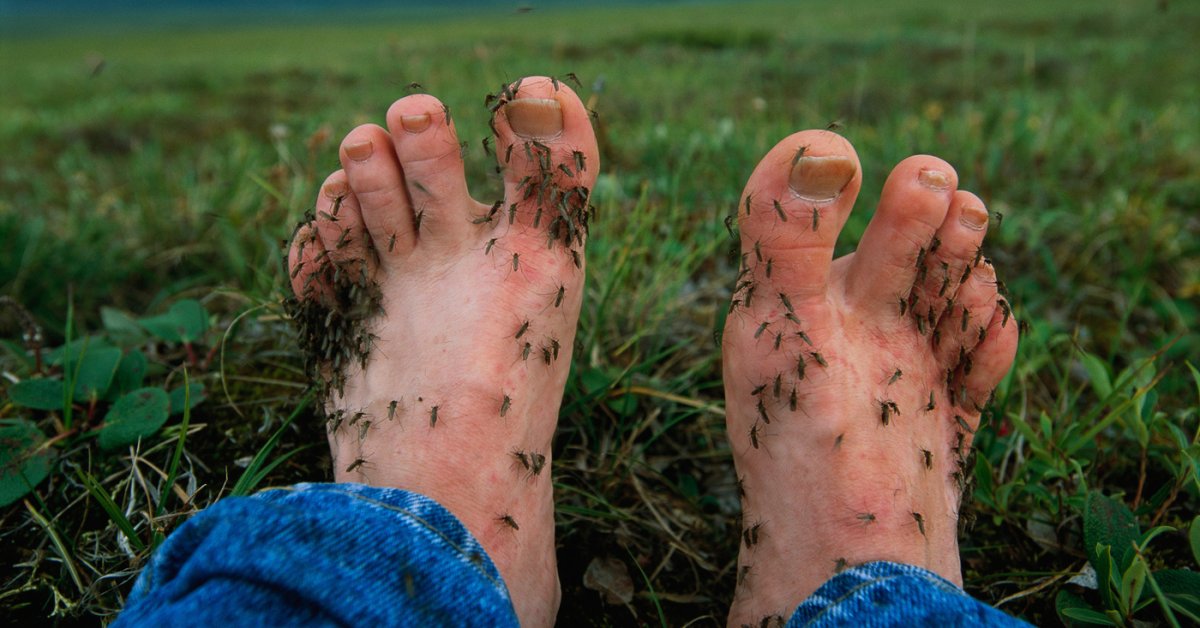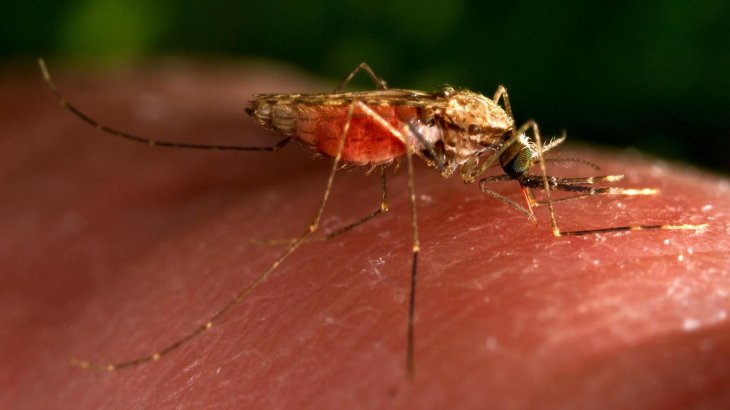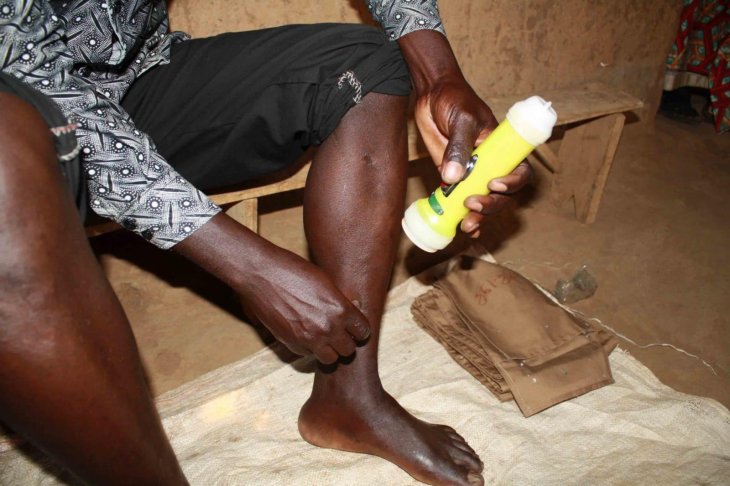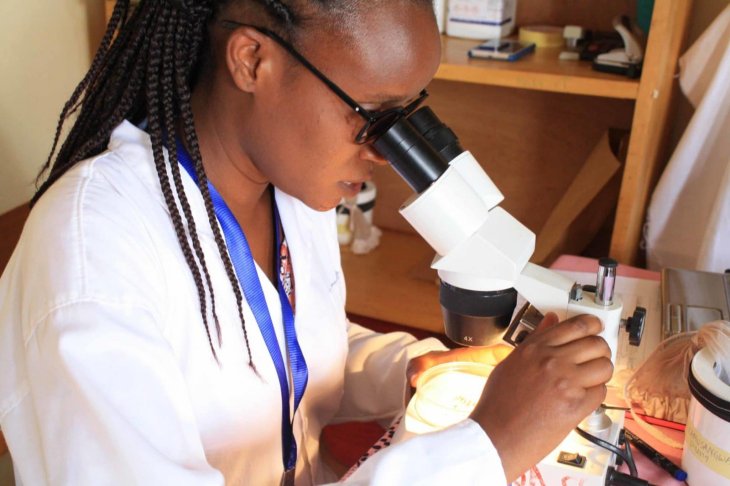“Human Bait,” A Weird Job That Helps Battle Malaria
Harin - May 16, 2020

Once everything was done, they turned off the light, sat on the chair, rolled up their pants, and waited for the mosquitoes to come.
- Mosquito 'Tornado' Horrifies Drivers In The Middle Of The Road
- 750 Million Genetically Modified Mosquitoes Will Be Released To Save Humans
- This Unique Laser Machine Is A Mosquito Detector
Mosquitoes: the most dangerous creature on the planet
According to the U.S. Centers for Disease Control and Prevention’s report, up to 50% of the world population is always at risk of getting mosquito-borne diseases. On average, mosquitoes kill more than 700,000 people annually and spread dangerous diseases like malaria, dengue fever, Japanese encephalitis, Zikia to millions of others.
Size-wise, mosquitoes belong to the small insect group. They are less than 1cm long, weigh up to 2.5mg, and fly relatively slow, at 1.5 to 2.5kmph. However, this creature has existed on our planet since 170 years ago, evolving into 3500 different branches with a countless number of individuals.

Since ancient times, humans and mosquitoes have already co-existed. The hotter, more humid an area, the more mosquitoes. There are 4 mosquito hotspots around the world, India, Ethiopia, Pakistan, and Rwanda.
In Rwanda, about 4 million people get malaria from mosquitoes every year. Despite using all kinds of methods, the residents can’t get rid of this creature.
Entering the 21st century, the World Health Organization decided to implement an insect surveillance program to thoroughly study the life, behavior, evolution of mosquitoes, and how to control them. Rwanda was one of the first countries to join this program.
Using human legs as a bait
The first step in deploying the program was to catch mosquitoes as test subjects. As Mareeba drowned itself in the darkness, the volunteers were ready. The spread a small tarpaulin on the ground, putting their “tools” including a flashlight, a small tube, and a cotton mouthpiece to trap the mosquitoes inside. Once everything was done, they turned off the light, sat on the chair, rolled up their pants, and waited.

During the process, the human bait wasn’t allowed to talk or use the phone. Innoc Bizimana, a volunteer, had to come over his neighbor’s house to avoid being disturbed by his children.
Every time he felt a mosquito landing on his leg, he gently turned on the flashlight, skillfully used a tube to pick it up, and put some cotton wool into the mouth of the tube.
There were 12 volunteers in Mareeba. They worked in shifts and changed every 6 hours. For each night, the volunteer got paid $3. In the morning, staff from the Bugesera entomology lab would visit, collect all the tubes.
The fight to control and eliminate malaria
Since 2005, Rwanda has prioritized the goal to get rid of malaria. According to statistics, in 2018, the country succeeded in lowering the number of malaria-related deaths by 80% compared to 2000.
Around Rwanda, people received mosquito nets and mosquito repellents. Each year, insecticides are periodically sprayed. Rwanda's health sector has dedicated its effort to address the malaria epidemic. They prioritize diagnosis and treatment for pregnant women and children under 5.

At the entomology lab, researchers have been observing, analyzing the behavior and genes of mosquitoes, testing new insecticides.
And with this goal, Rwanda has pushed the mosquito baiting activity. Each resident is a fighter, contributing their effort to the fight. Thanks to this, labs can observe the changes and the evolution of the mosquitoes, coming up with suitable plans.
After years of research, the Bugesera entomology lab discovered changes in the local mosquito population. The ubiquitous Anopheles gambiae mosquito is gradually replaced by the new species, Anopheles arabiensis.
In terms of appearance, these two look almost identical. They can only be distinguished under a microscope or via DNA sequencing. However, their habits and eating behavior are totally different.
Besides mosquitoes found in nature, entomology labs are also breeding mosquitoes as test subjects. Rwanda is determined to eradicate all mosquito-related diseases. But due to the COVID-19, the funding for mosquito research worldwide has been delayed, leading to an increase in malaria cases.
Featured Stories

Features - Jan 29, 2026
Permanently Deleting Your Instagram Account: A Complete Step-by-Step Tutorial

Features - Jul 01, 2025
What Are The Fastest Passenger Vehicles Ever Created?

Features - Jun 25, 2025
Japan Hydrogen Breakthrough: Scientists Crack the Clean Energy Code with...

ICT News - Jun 25, 2025
AI Intimidation Tactics: CEOs Turn Flawed Technology Into Employee Fear Machine

Review - Jun 25, 2025
Windows 11 Problems: Is Microsoft's "Best" OS Actually Getting Worse?

Features - Jun 22, 2025
Telegram Founder Pavel Durov Plans to Split $14 Billion Fortune Among 106 Children

ICT News - Jun 22, 2025
Neuralink Telepathy Chip Enables Quadriplegic Rob Greiner to Control Games with...

Features - Jun 21, 2025
This Over $100 Bottle Has Nothing But Fresh Air Inside

Features - Jun 18, 2025
Best Mobile VPN Apps for Gaming 2025: Complete Guide

Features - Jun 18, 2025
A Math Formula Tells Us How Long Everything Will Live
Read more

Mobile- Feb 16, 2026
Xiaomi Launches Affordable Tracker to Compete with Apple's AirTag
For users tired of ecosystem lock-in or high prices, the Xiaomi Tag represents a compelling, no-frills option that delivers core functionality at a fraction of the cost.

ICT News- Feb 15, 2026
X Platform Poised to Introduce In-App Crypto and Stock Trading Soon
X has been laying the groundwork for this expansion.

Mobile- Feb 17, 2026
Anticipating the Samsung Galaxy S26 and S26+: Key Rumors and Specs
The Samsung Galaxy S26 series is on the horizon, sparking excitement among tech enthusiasts.
Comments
Sort by Newest | Popular